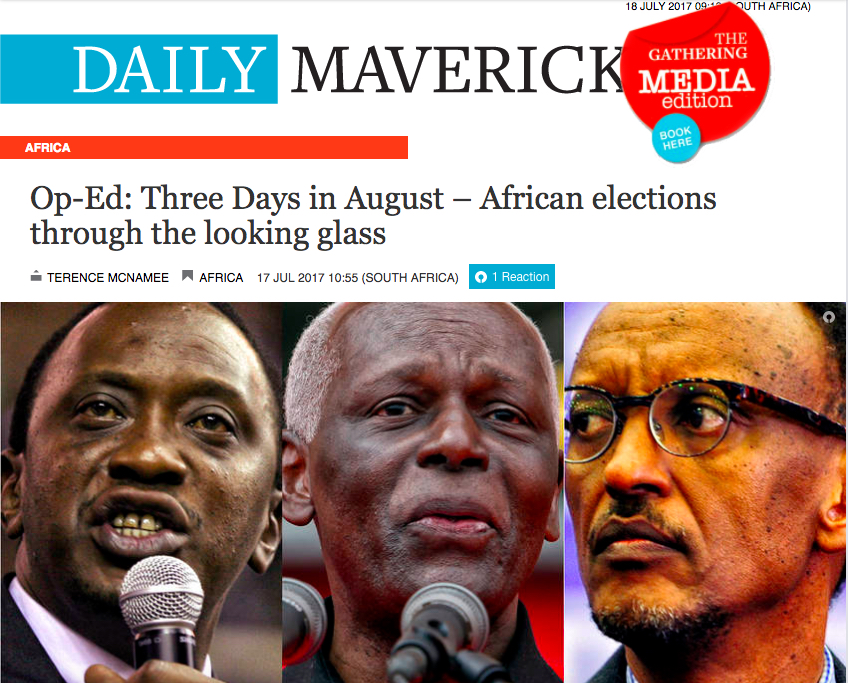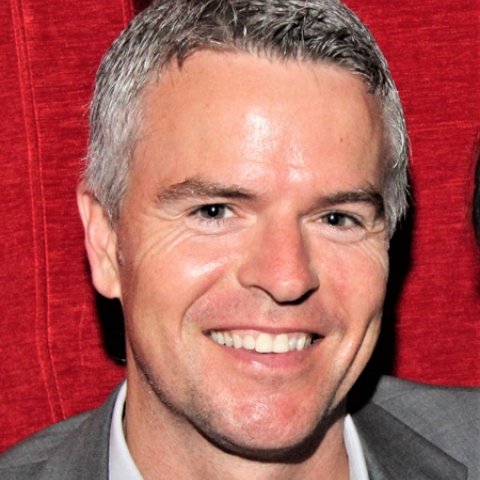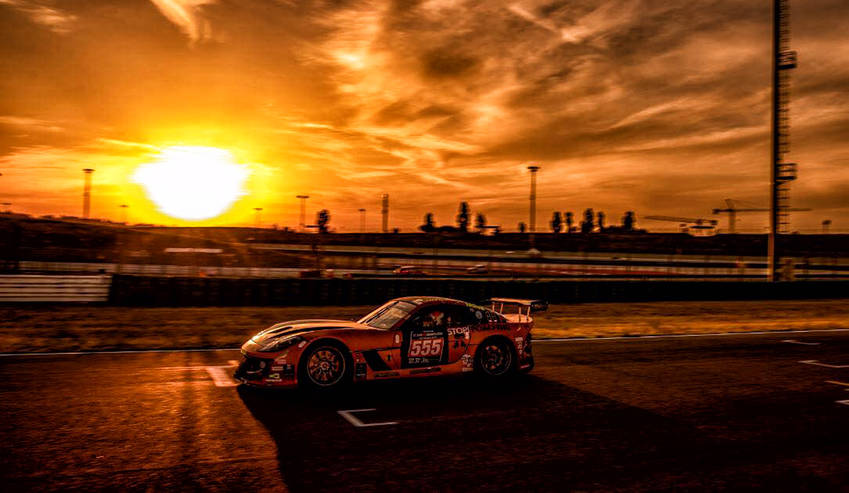News
Three Days in August — African elections through the looking glass"
If the number of competitive elections alone was a yardstick for democratic progress, Africa would be thriving.

Democracy in Africa will be in the spotlight next month when Angola, Rwanda and Kenya go the polls. More than 30-million voters will decide whether their country should change tack or stay the course. Elections are usually a time for pressing national issues to be debated, and a chance for voters to hold their leaders to account. Three days in August to witness democracy in action? Not quite, writes Terence McNamee.
The idea of elections as the heart of democracy dates back over two millennia to the Greek city states and republican Rome. If people can vote and choose their leaders freely based on what matters to them, then democracy is working. This common assumption has always been deficient. Today it seems decidedly unsound.
In the 1990s, the march of democracy seemed unstoppable. Today, the democratic world seems to have been turned sideways. An American election produced President Donald Trump. A British referendum inflicted the national self-harm that is Brexit. Populist politicians threaten to upend the established liberal order across the West. The Economist Intelligence Unit recently showed that countries with declining levels of democracy (measured by pluralism, civil liberties and political culture) now outnumber those becoming more democratic by more than 2 to 1.
If the number of competitive elections alone was a yardstick for democratic progress, Africa would be thriving. Only three African countries held them during the 1980s but between 1990 and 1994, the first multi-party elections in over a generation were convened in 29 out of 47 states in sub-Saharan Africa. Today they are the norm. Presidential term limits were almost non-existent in Africa three decades ago. More than two-thirds of the new constitutions enacted since then have included them. Peaceful transfers of power through the ballot box are becoming more common.
The quantity of elections, though, has not been matched by quality. Africans aren’t happy with the way their elections are run. Criticisms range from voter intimidation and violence to media bias, fraud and vote buying. Just 40% of Africans polled by Afrobarometer believe that their last elections were “free and fair”, and only 25% said that they trust their national election commissions “a lot”. This is not unexpected. Elections reflect the politics in which they are embedded. If the system is not healthy they are unlikely to function well either.
Africa mirrors current global trends: democratisation everywhere has stalled (the situation is worse in the Middle East and parts of Asia). Not enough is being done to grow democracy in between elections. The hard slog of institution building – developing constraints on the executive by judiciaries and legislatures, safeguarding the legal rights of citizens, building an informed society – has taken a back seat to elections, an event that comes around only once every five years or so. The touch of democracy day-to-day is still very light in much of Africa. Though it is getting stronger in some places, the foundation of illiberal legacies –colonialism, neo-patrimonialism – on which African democracy is being built is mostly porous.
Elections do not equal or even necessarily enhance democracy. Not all elections affirm democratic practice. Poorly-run or stolen elections can erode people’s faith in democracy. In some countries elections are not even about democracy or holding leaders to account. Elections serve different ends and have diverse meanings for voters.
Yet constrained and imperfect as elections are, we cannot do without them. They are the basis on which democratic governments can exercise legitimate authority. Well-managed elections can help to mediate conflict between opposing groups, root democratic norms and strengthen perceptions of inclusion and collective fate. Through elections, public sentiments and aspirations can be synthesised into a distinct policy agenda for governing. And they are the most effective way to remove incompetent leaders peacefully.
The three being held in Africa in August will all look like elections, at least in form – but each takes place in a context that dictates its substance.
Three elections
The upcoming vote in Kenya is closest to our conventional idea of democratic elections. Kenya trundled with more or less stability through nearly 30 years of one-party rule after independence, but today is an edgy, young, multi-party democracy. Its election on 8 August is a two-horse race between political dynasties: the incumbent, Uhuru Kenyatta, son of Kenya’s first president, and Raila Odinga, whose father was a major liberation figure and the country’s first vice president. This will be 72-year-old Odinga’s last attempt at the presidency. He failed in 2007 in a flawed election which triggered massive post-election chaos and violence, and again in 2013 in a largely peaceful vote which he lost to Kenyatta, a result he also disputed. He seems almost certain to cry foul again if, as expected, Kenyatta’s Jubilee Alliance Party win a narrow victory over his National Super Alliance coalition. This could plunge Kenya into a period of uncertainty and danger.
Shortcomings during the last poll – notably around the use of new voter technology – fuel suspicions that this election might not be credible. At the same time, though, this one could be better. A lot of work has been done to address problems not just in technology but also the voter’s roll and electoral boundaries. Lifted by its new constitution, Kenya’s democracy is growing, if somewhat messily. Kenyatta has the upper hand as the incumbent, but that is always the case even in the most established democracies. At the very least, democracy scholar Nic Cheeseman argues that voters have a real choice to make at the ballot box – the two candidates have very different visions and spending priorities.
Odinga could still defy the pollsters and prove to be third time lucky. Whichever outcome, Kenyan democracy will be put to the test. It may yet stumble. But no one should assume that it is destined to fail.
Rwanda’s election on 3 August will be another story. There is neither a real electoral choice nor any doubt about the victor. President Paul Kagame is up for re-election after securing a constitutional change that will allow him a third seven-year term in office. He is certain to be elected, after winning 93% of the vote in the previous election in 2010. His opposition lacks credibility. Amnesty International recently decried the huge and often deadly obstacles to participating in public life and voicing criticism of government policy in Rwanda. Only Eritrea has less free speech in Africa.
That is not to say Kagame’s popularity and hold on power are falsified. He is seen by most Rwandans (and plenty of outsiders) as a liberator, a nation-builder, and a strong ruler who has driven high rates of economic growth. But Kagame is wary of elections given his country’s recent history. His supporters blame the introduction of competitive elections (under pressure from the West) for having tilled the field for the later genocide, as Hutu-led political parties campaigned on virulent anti-Tutsi platforms in a fragmented political landscape during the early 1990s. Peppy democracy is viewed by many as a threat to inter-ethnic stability. That the Bertelsmann Stiftung’s Transformation Index (BTI) scored Rwanda 2 out of 10 for “free and fair elections” surprised no one.
Which begs the question: why even bother? One reason is popular legitimacy. Even if your election is more an “election-like event”, it’s increasingly hard to convey authority without one. An election geared towards endorsing the status quo will still be a useful litmus test for the direction of the country. It may also help to test loyalties and manage internal dissent. Kagame has frequently made the point that the Western model is not right for Africa, emphasising the need for Africans to redefine democracy in accordance with the continent’s unique history and needs. He knows better than most, however, that the alternatives to democracy are autocracies and dictatorships that usually cannot be removed without bloodshed.
In a similar vein, Angola holds its election on 23 August. President Eduardo dos Santos has called an end to his 38 years as head of state but he will remain the (influential) leader of the ruling MPLA party. His close ally and anointed successor, defence minister João de Matos Moura Lourenço, is expected to win convincingly. Not unlike Rwanda, memories of a brutal civil war and the past failure of multi-party democracy loom large in the MPLA’s justification for maintaining an iron grip on power and restrictions on the media. Disputed election results in 1992 helped re-ignite armed conflict which lasted until 2002.
This election is only the fourth since Angola gained independence in 1975. Voter behaviour is still largely determined by a generalised fear of returning to war and instability – stoked by MPLA propaganda – and nebulous ideas that life will get better by being in the winner’s camp. The “high politics” of the election will be about elite power bargaining and resource sharing. Dos Santos has spent years building up the “infrastructural power” of his family. Along with a tiny elite, they dominate the oil-rich state’s economy. Unlike Kagame, however, Dos Santos has not articulated a vision for the country that resonates in society. He has failed to tackle poverty and gross inequality. Declining oil revenues and rising inflation could spark pockets of unrest around election time, but state power is too concentrated for the opposition to significantly dent the MPLA’s electoral support. Actual political support for the government is harder to evaluate.
Better elections, stronger democracy
At no time in history have elections ever been perfect, either in function or outcome. The philosopher Karl Popper devoted part of his seminal work The Open Society and its Enemies to what happens when autocrats are freely elected or when “democrats” become autocrats in office. This conundrum is especially pronounced in traditionally illiberal political cultures.
The votes in Kenya, Rwanda and Angola next month are sure to be imperfect, in their own ways. Much ink will be spilled on the state of democracy in Africa based on what happens over these three days. But the important stuff that will affect democratic outcomes or not has already happened, in the months, even years, leading up to these elections.
Getting elections right is not easy. Popular demands that they reproduce democracy and reflect the will of the people are growing louder in Africa. But significant political will at multiple levels is needed to overcome the abuses – both blatant and subtle – that have impaired its electoral progress. Longer-term failings in civil education and engagement require even deeper commitment. A brief list of ways to improve African elections and restore the “power of the vote” back to the citizen might include the following:

Level the playing field between incumbents and the opposition. Incumbency is hard to overcome even in strong democracies. Like boxing, often you’ve got to knock the champion out to win the title. Abuses by democratically elected governments in Africa – of the public purse, security services, media, courts, electoral commissions – require specific remedies.
Any effort to promote equal treatment between incumbents and opposition parties should start with electoral commissions. They need to be strictly independent and professional, not politically appointed.
Campaign funding needs to be brought under control. Western models and formulas for placing all political parties on a more equal footing and exposing financial flows to scrutiny could be adapted.
In the face of likely electoral malfeasance, strong collaboration and unity of effort between opposition parties are essential. The outcome of Zambia’s disputed election is instructive. Had the main opposition party (whose leader is imprisoned on trumped-up treason charges, at the time of writing) formed political coalitions with other parties in the run-up to the election, might the government have been more constrained in its abuse of Zambia’s judicial and security processes in its aftermath? In 2015 Nigeria’s main opposition party would not have overcome such a determined incumbent had it not joined with other like-minded opposition groups prior to the election.
The role of the security services in safeguarding Africa’s constitutions (not regimes) needs to be reinforced. This is de facto impossible when the state and party have become one. Legitimate political opposition is then portrayed by governments in the grammar of security (“enemies of the state”). This usually transforms into a grammar of violence around election time, as Zimbabweans and others know only too well.
Outsiders, technology and education
Ultimately, all elections are local. Against those abusing elections, there are limits to what regional or global actors can do. Except in cases of widespread bloodshed and violence, the international community rarely puts its collective head above the parapet to sanction governments or opposition parties (when they’re at fault). A crude ethos has developed on African elections that if there was no violence, then basically it was a “good” election.
No one wants bad leaders. But we need to care more about how elections are won, not just who wins. Many, if not the majority, of African elections still lie in an ambiguous grey area, neither totally “free and fair” nor explicitly rigged or manipulated. Election observation missions have not found an effective vocabulary nor the means of responding to these situations. Since “free and fair election” in fact tells us very little about the precise quality of an election or how things have changed over time, experts are beginning to consider more concrete metrics. A grading system (1–10) could give more weight and rigour to election observation assessments. And more teeth, should it result in some elections being declared invalid. This could entail real political consequences for election abusers.
Africa has been a global pioneer in the deployment of technology in its elections. First used in the Democratic Republic of Congo elections in 2006, roughly half of all national-level elections in Africa now involve digital equipment of one form or another. Deployed effectively and operated proficiently, technology such as Biometric Voter Registration can improve the voter registration process, ensuring countries have accurate lists of voters, and reduce the scope for rigging.
Many governments as well as segments of the international development community have reified new technology as a panacea for all that ails African elections. But technology cannot fix broken institutions or act as a proxy for political will. Nor is it a substitute for doing the basics – i.e. developing reliable government records of national populations (deaths, births, marriages) that can be fed into a single repository. Until the conditions that give rise to politicisation and manipulation are addressed, Africa should not waste limited resources on expensive gadgets.
More money should be spent on civil education instead. Knowing your rights and responsibilities as citizens doesn’t happen naturally. Africa’s colonial history is an unhelpful guide to understanding what a good election and well-functioning democracy look like. Civil education has a vital role in formulating ideas about elections, not as events but embedded parts of democracy. Many elections still do more to entrench the winner-takes-all mentality in Africa than loosen it. The rewards of victory are simply too great, the costs of failure too severe.
Public indifference is often a key expediter of authoritarian behaviour. Education and continuous dialogue on democracy across society are the best antidotes to voter apathy. In states affected by war, young people who succumb to election ennui require urgent attention, lest they see violence as a better route to better lives.
And one more day (in 2019)
South Africa’s much-lauded Independent Electoral Commission is Africa’s current standard-bearer. Doubtless it will face its sternest test of the post-apartheid era in 2019, should the party which has run the country since 1994 – the African National Congress –adopt undemocratic means to shore up its waning popularity. Many fear a dramatic amplification of previously-used tactics in an effort to win an election of unprecedented competitiveness. In the past, the ANC has been accused of distributing food parcels to buy votes, using government resources to boost ANC electioneering, and issuing tenders to raise campaign funds. And no one currently reading about the alleged activities of the State Security Agency could be assured of its neutrality in 2019. In all this, the maintenance of the IEC’s professionalism and independence is sacrosanct.
If past elections in democratic South Africa are a reliable guide, the incumbent in the Union Buildings deserves the benefit of the doubt. It is a proud history. What has happened in Zambia, Zimbabwe and elsewhere at election time is not fated to happen here. But South Africans must nevertheless be prepared. The better angels of the ANC have not been seen for a while.
This article was originally published in The Daily Maverick.


